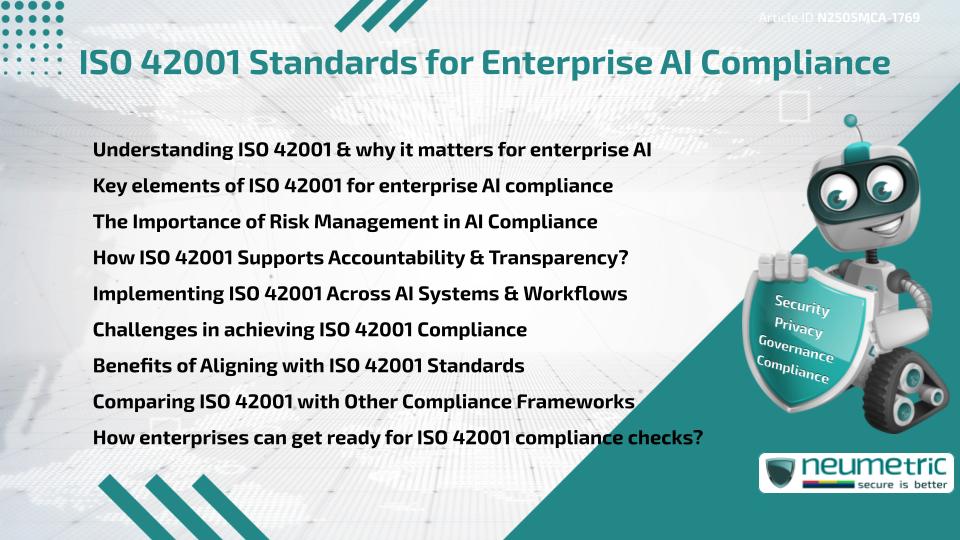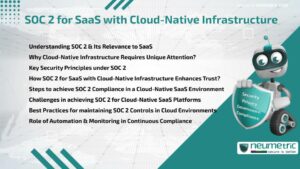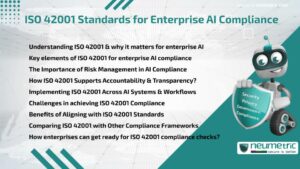Table of Contents
ToggleIntroduction
The growing reliance on Artificial Intelligence [AI] in Business Operations brings efficiency, innovation & competitive advantages. However, it also introduces new Risks related to fairness, accountability & misuse. To address these Risks in a structured way, the ISO 42001 standards for enterprise AI Compliance provide an international benchmark for managing AI responsibly. These standards help organisations establish clear Policies, Procedures & Controls to ensure ethical & legal use of AI.
This article explores the significance of ISO 42001, how it applies in enterprise settings & what organisations can do to comply.
Understanding ISO 42001 & why it matters for enterprise AI
ISO 42001 is the first global Standard focused entirely on the Governance of AI Systems. It was introduced to help enterprises design, develop & deploy AI responsibly while managing associated Risks. The Standard is similar in structure to other ISO frameworks, such as ISO 27001, but it is tailored specifically for the unique challenges AI presents.
ISO 42001 outlines how organisations can build an Artificial Intelligence Management System [AIMS] to ensure AI tools are aligned with legal requirements, Stakeholder expectations & ethical values.
Key elements of ISO 42001 for enterprise AI compliance
Essential elements of the corporate AI compliance ISO 42001 standards:
- Policy Framework: Organisations must define their AI Governance Policies.
- Stakeholder Analysis: The impact of AI decisions on users, customers & regulators must be considered.
- Risk Assessment Procedures: Businesses should regularly assess Risks linked to AI functions & data inputs.
- Continuous Monitoring: AIMS must include mechanisms to monitor, Audit & improve AI Systems.
- Transparency Measures: Clear documentation & explainability should be integrated into AI Models.
Each of these components ensures that AI does not operate in isolation from business goals or societal expectations.
The Importance of Risk Management in AI Compliance
One of the key strengths of the ISO 42001 standards for enterprise AI Compliance is its strong emphasis on Risk-based thinking. AI Systems can behave unpredictably or produce biased outputs if not properly managed. Risk Management under ISO 42001 helps organisations:
- Identify where harm might occur
- Quantify the potential impact
- Apply mitigation strategies
- Track emerging Risks
How ISO 42001 Supports Accountability & Transparency?
Enterprise AI Systems are often criticised for their lack of transparency. ISO 42001 helps solve this by requiring businesses to document:
- How decisions are made using AI?
- Who is responsible for oversight?
- Which data are utilised for model evaluation & training?
This creates a clear line of accountability, which is crucial when issues such as data misuse or unintended discrimination arise.
Implementing ISO 42001 Across AI Systems & Workflows
Businesses need to follow a structured method to implement the ISO 42001 standards for enterprise AI compliance effectively. This includes:
- Appointing an internal AI Compliance officer or team
- Carrying out a comparison between current processes & the expectations set by ISO 42001
- Developing AI-specific controls & metrics
- Training staff across departments on the basics of AIMS
- Creating Feedback Loops to improve AI Performance over time
Organisations are encouraged to integrate these steps into their current management frameworks to prevent duplication of effort.
Challenges in achieving ISO 42001 Compliance
Although ISO 42001 offers a strong foundation for AI governance, it also presents certain implementation difficulties such as:
- Technical Complexity: Understanding AI’s inner workings is not always easy for non-technical staff.
- Cost: Building a compliant AIMS may require new tools or external audits.
- Scalability: Applying consistent AI Policies across a large enterprise can be difficult.
These limitations do not negate the value of the Standard but highlight the need for tailored implementation plans.
Benefits of Aligning with ISO 42001 Standards
Although there are some challenges, following ISO 42001 provides distinct & useful benefits like:
- Improved Governance: A formal structure promotes ethical development.
- Regulatory Readiness: Being compliant reduces the Risk of legal penalties.
- Stakeholder Trust: Customers, partners & investors value transparency in AI use.
- Operational Efficiency: Clear controls reduce rework & system failures.
These benefits make the Standard a worthwhile investment for any organisation relying on AI.
Comparing ISO 42001 with Other Compliance Frameworks
Several other frameworks touch on AI Governance, such as:
However, ISO 42001 differs by offering a certifiable structure, making it easier for organisations to prove Compliance. It complements rather than replaces these frameworks by serving as a central Governance model.
How enterprises can get ready for ISO 42001 compliance checks?
Preparation is key to successful implementation. Enterprises can:
- Identify all AI Systems in use
- Perform a Risk & impact assessment for each
- Develop & document AI Policies
- Set up regular training & awareness sessions
- Engage Third Party Auditors for gap assessments
By starting early, businesses can reduce surprises during certification & demonstrate commitment to Ethical AI Practices.
Takeaways
- ISO 42001 marked the introduction of a global standard focused on managing AI responsibly within business environments.
- It introduces AIMS, a structured Framework to manage AI Risks & impacts.
- The enterprise AI compliance ISO 42001 standards provide responsibility, trust & transparency.
- Aligning with the Standard improves readiness for global regulations.
- Although there are obstacles, putting the standard into practice is worthwhile in the long run.
FAQ
What is ISO 42001 & why is it important for enterprises?
ISO 42001 is an international Standard that helps businesses manage Artificial Intelligence responsibly through structured processes & Risk controls.
How do ISO 42001 standards for enterprise AI Compliance differ from general IT Governance?
While IT Governance focuses on information systems broadly, ISO 42001 is tailored specifically to the challenges & Risks unique to AI.
Can small enterprises benefit from ISO 42001?
Yes, small enterprises can scale the requirements to their needs & still benefit from structured AI Governance & improved Stakeholder trust.
What is an Artificial Intelligence Management System [AIMS]?
AIMS is a structured Framework defined in ISO 42001 to help organisations plan, monitor & improve their use of AI Systems.
Does ISO 42001 replace the need for AI Risk frameworks like NIST AI RMF?
No, it complements them by offering a certifiable structure that can integrate principles from frameworks like NIST AI RMF.
Is ISO 42001 mandatory for AI-based enterprises?
Currently, it is not mandatory but increasingly adopted as a best-practice Standard to prepare for evolving legal requirements.
How long does it take to implement ISO 42001 standards for enterprise AI Compliance?
Implementation time varies based on enterprise size & AI complexity, but a structured rollout can take anywhere from three (3) to twelve (12) months.
What kind of organisations issue ISO 42001 Certifications?
Accredited Certification Bodies that specialise in international standards conduct ISO 42001 audits & issue certificates upon successful Compliance.
Need help?
Neumetric provides organisations the necessary help to achieve their Cybersecurity, Compliance, Governance, Privacy, Certifications & Pentesting goals.
Organisations & Businesses, specifically those which provide SaaS & AI Solutions, usually need a Cybersecurity Partner for meeting & maintaining the ongoing Security & Privacy needs & requirements of their Clients & Customers. SOC 2, ISO 27001, ISO 42001, NIST, HIPAA, HECVAT, EU GDPR are some of the Frameworks that are served by Fusion – a centralised, automated, AI-enabled SaaS Solution created & managed by Neumetric.
Reach out to us!





